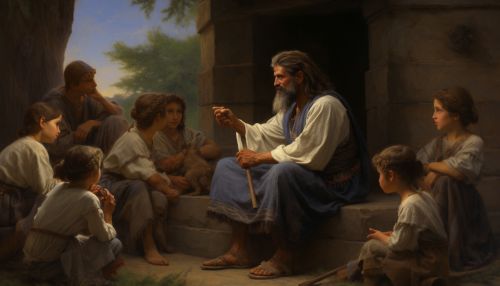Myth
Origins of Myth
The term "myth" originates from the Greek word "mythos", which translates to "story" or "speech". In ancient cultures, myths were often intertwined with religion and were used to explain natural phenomena, cultural practices, and historical events. They were considered to be both sacred and true, and were passed down from generation to generation through oral tradition Learn more about oral tradition.


Types of Myths
Myths can be broadly categorized into three types: cosmogonic, etiological, and eschatological.
Cosmogonic Myths
Cosmogonic myths, or creation myths, explain the origin of the universe. These myths often involve a supreme being or a group of deities who create the world out of chaos or from pre-existing materials. Examples of cosmogonic myths include the Genesis creation narrative in the Bible and the Big Bang theory in modern science.
Etiological Myths
Etiological myths, or origin myths, explain the cause or origin of natural phenomena, customs, institutions, or other aspects of human life. For instance, the myth of Pandora's box in Greek mythology explains the origin of evil in the world.
Eschatological Myths
Eschatological myths, or end-of-the-world myths, describe the ultimate fate of the universe. These myths often involve apocalyptic events or a final judgement day. Examples include the Christian belief in the Second Coming of Christ and the Norse myth of Ragnarok.
Functions of Myths
Myths serve various functions in different cultures. They provide a framework for understanding the world and human existence, establish moral and social norms, and foster a sense of community and cultural identity.
Explanation
Myths often serve to explain the unexplainable. They provide answers to fundamental questions about the origin of the universe, the nature of gods and spirits, the purpose of life, and the mysteries of death.
Education
Myths are also used as educational tools. They teach moral lessons, convey cultural values, and instill societal norms. Through myths, individuals learn about their roles and responsibilities within their community.
Identity Formation
Myths contribute to the formation of cultural identity. They provide a sense of belonging and continuity, linking the present to the past and the individual to the community.
Myth and Religion
Myths and religion are closely intertwined. In many cultures, myths form the basis of religious beliefs and practices. They provide a narrative framework for understanding the divine and the sacred, and for interpreting religious rituals and ceremonies.


Myth in Literature and Art
Myths have had a profound influence on literature and art. They have been a source of inspiration for poets, playwrights, novelists, painters, and sculptors throughout history. In literature, myths have been reinterpreted and retold in various forms, including epic poems, dramas, novels, and short stories. In art, myths have been depicted in paintings, sculptures, mosaics, and other visual forms.
Modern Interpretations of Myth
In the modern world, the term "myth" has taken on new meanings. In common parlance, a myth is often equated with a false belief or a fabricated story. However, in academic disciplines such as anthropology, sociology, and psychology, myths are studied as symbolic narratives that reflect the beliefs, values, and experiences of a culture.
Myth and Psychology
In the field of psychology, myths have been analyzed from a psychoanalytic perspective. Carl Jung, a Swiss psychiatrist and psychoanalyst, proposed the concept of the "collective unconscious", a part of the unconscious mind that is shared by all members of a species. He argued that myths are expressions of the collective unconscious and contain archetypal symbols that reflect universal human experiences.
Myth and Sociology
In sociology, myths are viewed as social constructions that serve to legitimize and reinforce societal norms and values. They are seen as instruments of social control, used to maintain social order and cohesion.
Myth and Anthropology
In anthropology, myths are studied as cultural narratives that provide insights into the beliefs, customs, and worldview of a society. They are considered to be a form of cultural expression, reflecting the collective wisdom and experience of a people.
